Tensions laid bare as Germans worry about immigration ahead of election
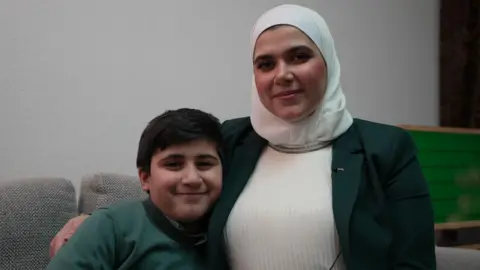 BBC
BBC"I was crying," says Alya, when she saw news of last week's Munich attack that left a toddler and her mother dead.
"Why should someone do something like that? Why? I can't understand it."
An Afghan man's in custody after what was the latest in a series of attacks in German cities where the suspect has been an asylum seeker.
Last Thursday it was a mother and daughter in Munich; last month another child and an adult were killed in Aschaffenburg.
Alya came here a decade ago from Syria with her baby son. Now 10, he and his mother welcome me into their home.
They were among a record 1.2 million people who applied for asylum in Germany from 2015-16, many of them from Syria but also from countries including Afghanistan and Iraq.
The attacks have put security and migration front and centre of an election campaign, days before Germans vote on their next government on 23 February.
Alya despairs of those who commit violence in a country that, she says, has "given us everything".
The BBC first heard their story a decade earlier when they were filmed at a refugee centre in the city of Oberhausen.
Rami looks at a photo of himself from 2015. He's tiny, enveloped in a life jacket from when his mother fled war-torn Syria.
"How could I go with him in that boat?" she asks herself, remembering how they crossed the Aegean Sea with 60 others, packed in a small boat.
"I didn't know I'd gone through that," says Rami. It scares him to see it now.
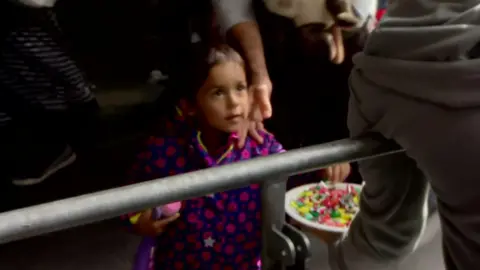
Ten years on, Alya has trained in elderly care and re-married. She is looking for work, while Rami goes to a local school and is a passionate football fan.
They both speak German: Rami has grown up with the language and Alya has studied it.
They're grateful to their adopted country and plan to stay; Rami has dreams of becoming a doctor, policeman or footballer.
Mother and child have, unsurprisingly, changed in the past 10 years.
So has Germany.
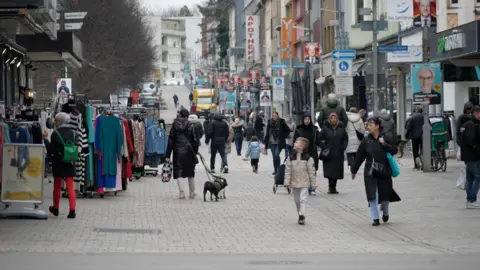
Back in 2015, there were scenes of sweets being handed out to refugees arriving at Munich train station, as an unparalleled number of people fled to Europe due to conflict, instability or poverty.
German Willkommenskultur, or Welcoming Culture, was encapsulated when the then chancellor, Angela Merkel, declared: "We can manage this."
For her supporters, it was a pragmatic and compassionate reaction; for her critics, one of her most unforgivable mistakes.
A decade later and anyone I have spoken to agrees that attitudes have hardened, in society and politically.
Alya says she has "lots of German friends" but has detected the broader change in mood in Germany and mentions hearing the phrase Ausländer raus – foreigners out.
However she is "very sad" about refugees and migrants who don't learn German or, in her view, have failed to properly integrate.
"The key to this country is the language," she says, while adding: "There's also a positive side that a lot of people have learned the language and they've started to work."
Near Oberhausen's main park, Georg, 66, says he gets on with people from all backgrounds but worries about cases of "radicalisation."
He has lived in the city most of his life and used to work as a car mechanic and tiler. He mourns what he sees a general decline in Oberhausen, pointing to because of ageing infrastructure and a lack of investment.
Many in Germany also talk of a wish for greater public safety and a disillusionment with the parties that have governed the country since reunification.
Germany's outgoing government has reimposed border controls as it tries to bring down the number of asylum seekers, and opposition parties want to go further.
Georg says it's a difficult issue but believes there needs to be security: "No matter who's in charge. Not like it is right now. It has to change."
Before Europe's migration crisis, Oberhausen was already a multicultural city.
Local government figures show that in 2010, 22% of people in Oberhausen were either not born as German citizens or had one immigrant parent.
By 2016, that figure had risen to 28% while the latest figure, from 2023, was up to 37%.
Walking through the centre, the strained nature of Germany's migration debate becomes quickly evident.
Around one corner, there's a demonstration against the far-right Alternative for Germany (AfD) party which has embraced the concept of "remigration"; a phrase widely understood to mean mass deportations.
On the main street, an AfD party stand has been put up, but it soon attracts shouts of "Nazis."
Two men of colour end up in a heated argument with party activists which we are openly filming.
We hear one of the AfD campaigners, who we'd been speaking to earlier, say: "Go back to your Heimat (homeland) if you don't like this here."
When I challenge this man, Jörg Lange, afterwards, he denies the remark was racist.
A city councillor, he tells me voters will have their say and voices scepticism that one of the men grew up here, despite their fluency in the language.
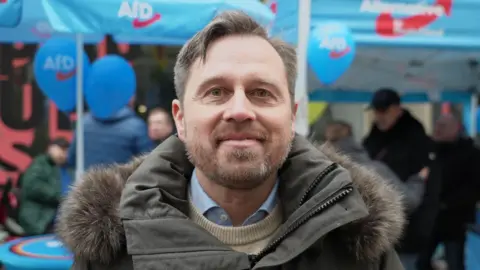
"Would you have said the same thing to a white person?" I ask.
"No, of course not," Mr Lange replies – but again denies it's racist.
"He personally attacked me," says Mr Lange. "He said 'you're a Nazi'. And then of course you have to say that if something doesn't suit you here in Germany then you can go back. Then leave us alone here."
Police arrive, during which time I talk with the two men involved in the argument, Kwame and Prathep, who are both in their thirties.
"He told us to go back!" says Kwame while Prathep says going "back" would mean going about, "Three streets away from here."
"We went to school over here, we grew up over here… we have kids here," they tell me. "We pay taxes, we pay a lot of taxes!"
I ask the pair about whether their role in the altercation is adding to the rising temperature of political debate.
Kwame, who used the term "Nazis" in the argument, says the "derogatory" language he hears about people of colour "triggers" him. "We feel like, wow, are we still in the same place right now?"
A dance choreographer, he tells me he came to Germany from Ghana aged 13 while Prathep describes how he was born in the city.
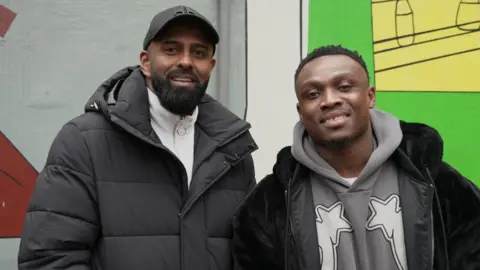
"I'm a German," says Prathep. "I'm proud of this city," chimes in Kwame. "Wherever I go in the world [I say] I'm from Oberhausen."
Both think their community has become "drastically" more divided in recent years.
The political climate, which includes consistently strong polling for the AfD, has led to a toughening of language by some of Germany's main political parties.
The conservative Christian Democrats who lead the polls have called for a "border ban" on anyone entering Germany without the right papers, even if they're seeking protection.
The Social Democrats have pledged to speed up asylum procedures and boost deportations.
The AfD want to close Germany's borders and leave the common European asylum policy.
Alya hopes that Germany will keep its doors open to refugees: "There's still war everywhere. And the people need this… maybe there are very good people running away from war."
The future of Germany's migration policy will depend on which parties form a coalition after this election, and what they can agree on.
But a rightward shift is already underway, in reality and rhetoric.
